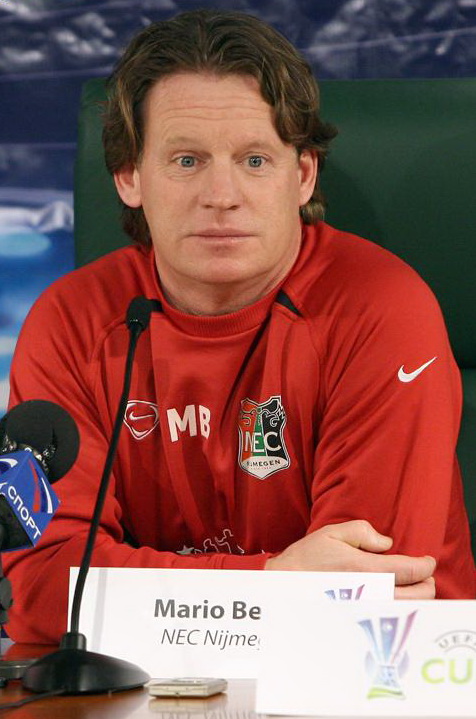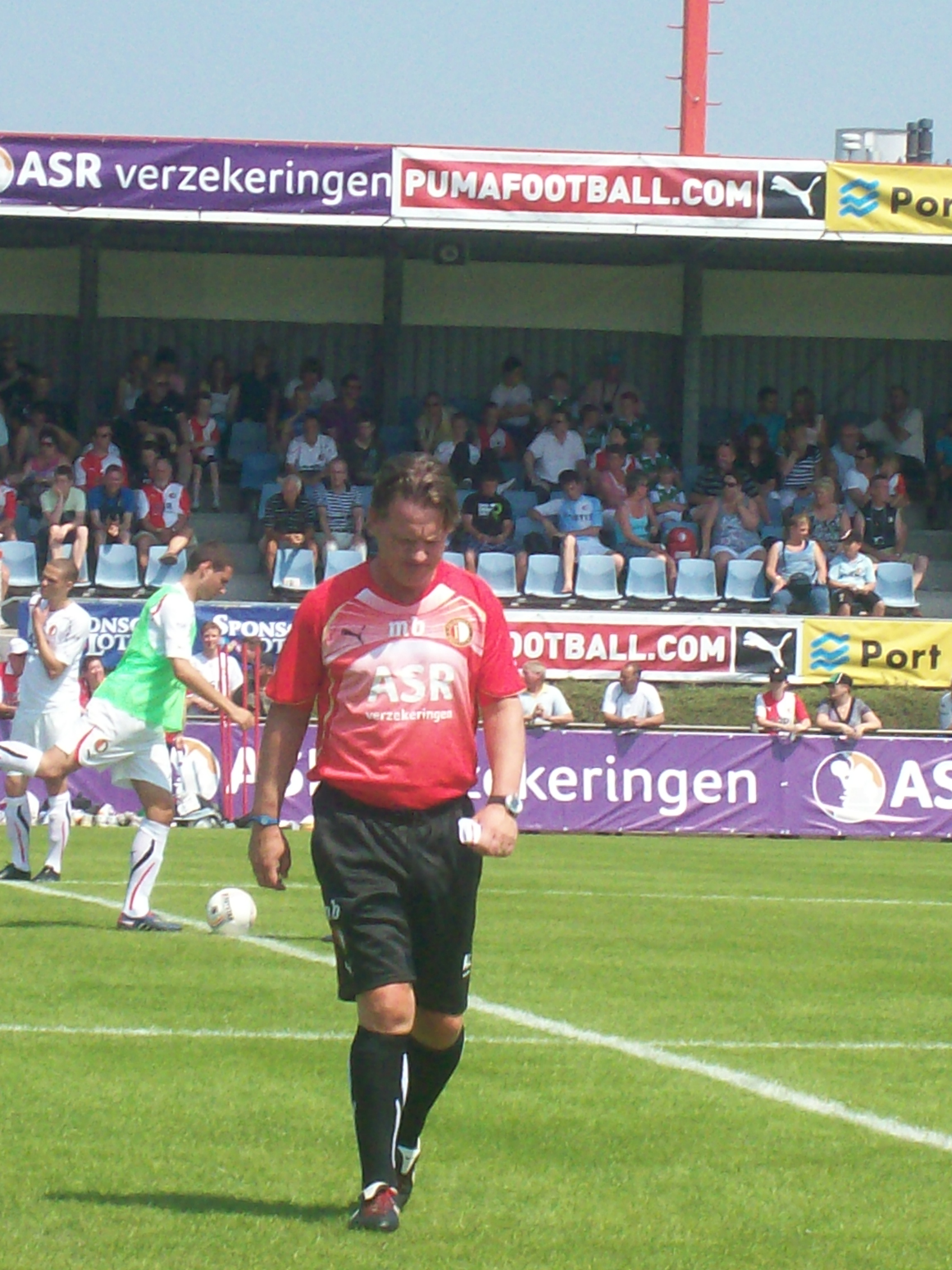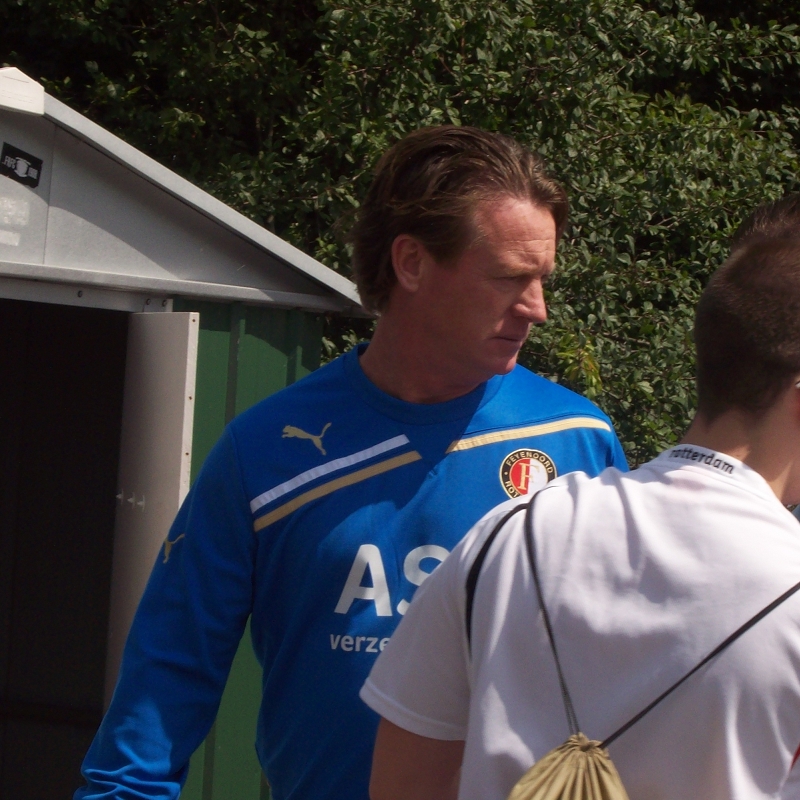1. Overview
Marinus Antonius Been, widely known as Mario Been, is a Dutch football manager and former professional player. Born in Rotterdam, he was an attacking midfielder renowned for his exceptional dribbling skills, earning him the nicknames "Mariodona" (after Diego Maradona) and "Super Mario." His playing career spanned from 1982 to 1995, primarily with Feyenoord in the Netherlands, but also included stints with Pisa in Italy and Tirol Innsbruck in Austria, before concluding with Excelsior.
After retiring as a player, Been transitioned into coaching, holding various assistant and head coaching roles. He achieved significant success managing Excelsior, leading them to promotion, and later guided NEC Nijmegen to European competition. He also managed his boyhood club Feyenoord, Genk in Belgium, where he won the Belgian Cup, and APOEL in Cyprus. His career is marked by a distinctive playing style and a passionate approach to management, leaving a notable impact on the clubs he served.
2. Playing career
Mario Been's professional football journey began in his hometown of Rotterdam, where he developed a reputation as a technically gifted and charismatic midfielder.
2.1. Early life and youth career
Born on 11 December 1963 in Rotterdam, Been grew up as the son of a dockworker. He began playing football on the Tarwewijk squares before joining FC Rotterdam at the age of seven. The following year, he was transferred to the Feyenoord youth system, where he quickly distinguished himself as an attacking midfielder. He made his top-team debut for Feyenoord at 18 in the Rotterdam AD Tournament under club icon Willem van Hanegem, scoring a goal against Arsenal after coming on as a substitute.
2.2. Feyenoord
Been made his official professional debut for Feyenoord on 5 September 1982, in a 1-0 victory over N.E.C.. He spent six years at Feyenoord from 1982 to 1988. During the 1982-83 season, he regularly featured under manager Hans Kraay Sr.. However, his playing time decreased the following season with the arrival of Johan Cruyff, even as Feyenoord won both the league and cup titles. Despite this, in 1984, Been was awarded the Gouden Schoen (Gouden SchoenGolden BootDutch) as the best talent, surpassing notable players like Marco van Basten and his teammate Ruud Gullit. He was part of the Feyenoord squad that secured the domestic league and cup double in 1984.
2.3. Overseas career
In July 1988, Been moved from Feyenoord to Italy, joining Pisa. He spent three seasons with the club, playing in both Serie A (the top flight) and Serie B (the second division). Following his time in Italy, Been moved to Austria in 1992, where he joined Tirol Innsbruck for one season.
2.4. Return to Netherlands and later career
After his three years in Italy, Been returned to the Netherlands, first joining Roda JC and then Heerenveen. After one season at Heerenveen, he returned to his hometown club, Excelsior, in 1993. At Excelsior, he became a central figure and served as the team captain. Been played his last competitive match on 17 September 1995, a 4-0 defeat against Haarlem, before announcing his retirement from professional football.
2.5. International career
Been represented the Netherlands at the youth level, participating in the 1983 FIFA World Youth Championship. In this tournament, he played alongside future stars like Marco van Basten and Gerald Vanenburg, appearing in four matches and scoring two goals. In the opening match against Brazil, he famously dribbled past three defenders before chipping the ball over the goalkeeper for the opening goal, astonishing over 60,000 spectators in Guadalajara, Mexico.
On 14 November 1984, at the age of 20, Been earned his single official international cap for the Netherlands in a World Cup qualifier against Austria. He came on as a substitute for Ton Lokhoff in the 73rd minute, playing for a total of 18 minutes in a match that the Netherlands lost 0-1. Despite his promising talent, he was not called up to the national team again.
2.6. Playing style and nicknames
As an attacking midfielder, Been was known for his exceptional technical ability, superb kicking, and accurate ball touch. His dribbling skills were particularly outstanding, leading supporters to nickname him "Super Mario" and "Mariodona," a portmanteau of his first name and the legendary Argentine footballer Diego Maradona. Beyond his on-field prowess, Been was also known for his cheerful and mischievous personality, which earned him the nickname Pietje BellDutch from the media, referencing a popular Dutch children's book character known for his pranks and good nature.
3. Managerial career
Mario Been embarked on his coaching career shortly after retiring as a player, steadily progressing through various roles before becoming a prominent head coach in Dutch and Belgian football.
3.1. Early coaching roles
Been began his coaching career in 1996, working with the youth teams at Excelsior until 2000. In 2000, he joined Feyenoord as an assistant manager under Bert van Marwijk, a position he held until the summer of 2004 when Van Marwijk departed for Borussia Dortmund. After leaving Feyenoord, Been took on a role as a tactical analyst for the Trinidad and Tobago national football team under Leo Beenhakker for the 2006 FIFA World Cup. He left the Trinidad and Tobago setup after the tournament.
3.2. Excelsior
In 2005, Been returned to Excelsior, Feyenoord's sister club, taking on his first head coaching role. In his sole season in charge, he achieved remarkable success, leading the club to promotion from the Eerste Divisie (second tier) to the Eredivisie (top tier). His team played an attractive style of football and finished seven points clear of second-placed VVV-Venlo.
3.3. NEC Nijmegen
Following his successful spell at Excelsior, Been moved to NEC Nijmegen in 2006, succeeding Ron de Groot, who reverted to his assistant coach position. Been arrived with ambitions of restoring the club's former glory. In his first season (2006-07), he guided NEC to a tenth-place finish in the Eredivisie.

The 2007-08 season began poorly, with NEC at the bottom of the league by the new year. However, Been orchestrated a remarkable turnaround, leading his team on a strong run that saw them finish eighth in the league standings. This earned them a UEFA Cup Play-off berth against three other Dutch teams. His team's attractive, goal-scoring football proved effective, culminating in a dominant 6-0 home victory and a 1-0 away win against NAC Breda in the final play-off round. This achievement marked the first time Been had qualified a team for European competition.
The 2008-09 season became Been's finest as a professional manager. NEC was drawn into a tough UEFA Cup group alongside Spartak Moscow, Dinamo Zagreb, Tottenham Hotspur, and Udinese. Initially labeled as the "whipping boys" of the group, NEC overcame two initial losses to defeat Spartak Moscow 2-1 in Russia, with Lasse Schöne scoring a crucial goal. In the decisive final group game, Been's team secured a 2-0 victory against Udinese, ensuring their progression to the next round. Although they eventually lost 4-0 on aggregate to Hamburger SV, Been had etched his name into the club's history. On 28 January 2009, an agreement was reached for Been to move to Feyenoord as head coach for the next season. His final match as NEC manager was an emotional occasion at Goffert Stadium, where fans, players, and the board applauded him, singing his name and acknowledging him as one of the club's best managers. Been's tearful farewell speech underscored his legendary status.
3.4. Feyenoord
In the summer of 2009, Been returned to his boyhood club, Feyenoord, with the task of revitalizing the financially struggling team. He was given a very youthful squad, complemented by a few experienced players such as Roy Makaay, Denny Landzaat, and Giovanni van Bronckhorst. His first signing was Dani Fernández from his former club.

Been's first season at Feyenoord was a success, as he led the team to a fourth-place finish in the league, securing a spot in the UEFA Europa League for the 2010-11 season. This was the club's highest league finish in several years. The following summer was turbulent, with all the experienced players retiring and only a handful of free or loan signings joining the squad. Feyenoord started the new campaign with mixed results, winning their opening match against Utrecht 3-1, but failing to qualify for the Europa League group stages after a 2-1 aggregate loss to Gent.

Despite having a contract until 2012, Been's tenure took a difficult turn. On 24 October 2010, he oversaw Feyenoord's historic 10-0 defeat against PSV at the Philips Stadion, the largest loss in the club's history. The season concluded disappointingly, with Feyenoord failing to qualify for European football and even facing relegation danger at one point. Despite these challenges, he was confirmed to remain at the helm for the new season. However, on 13 July 2011, Been announced his departure from Feyenoord, citing a lack of trust and confidence from his players as the primary reason for his surprising decision. He later publicly criticized technical director Martin van Geel for his handling of the situation, stating that he never wanted to see Van Geel again.
3.5. KRC Genk
In late August 2011, Been was appointed as the new manager of Belgian club Genk, signing a two-year deal. He succeeded Franky Vercauteren, who had departed to join Al-Jazira after leading Genk to the Belgian League title and the 2011 Belgian Supercup, and guiding them to the play-off for the UEFA Champions League. Been held his first training session with Genk on 31 August and reunited with Thomas Buffel, whom he had coached as an assistant at Feyenoord.
His first match as Genk manager was a 4-3 victory over rivals Sint-Truidense. In the Champions League, Genk finished fourth in Group E with three points, recording no wins, three draws, and three losses. Their first Champions League point came from a 0-0 draw against Valencia. On 9 May 2013, Been led Genk to victory in the 2012-13 Belgian Cup. Despite this success, he was sacked on 23 February 2014.
3.6. APOEL
On 26 May 2017, Been was appointed as the new manager of the reigning Cypriot champions APOEL, signing a one-year contract. However, his tenure was remarkably short. On 28 July 2017, after just three competitive games in charge, Been was dismissed by APOEL following a 1-0 away defeat in a European match against Viitorul Constanta.
4. Managerial statistics
| Team | From | To | Competition | Record | |||||||
|---|---|---|---|---|---|---|---|---|---|---|---|
| G | W | D | L | GF | GA | GD | Win % | ||||
| Excelsior | 2005 | 2006 | Eerste Divisie | 38 | 22 | 9 | 7 | 68 | 25 | 57.89 | |
| KNVB Cup | 2 | 1 | 0 | 1 | 6 | 6 | 50.00 | ||||
| Total | 40 | 23 | 9 | 8 | 74 | 31 | 57.50 | ||||
| N.E.C. | July 2006 | 9 June 2009 | Eredivisie | 102 | 35 | 30 | 37 | 126 | 134 | ||
| 34.31 | |||||||||||
| KNVB Cup | 9 | 6 | 0 | 3 | 19 | 11 | 66.67 | ||||
| Europe | 8 | 3 | 1 | 4 | 7 | 9 | |||||
| 37.50 | |||||||||||
| Other (Includes Johan Cruijff Shield and Eredivisie UEFA and Intertoto play-offs.) | 10 | 7 | 1 | 2 | 17 | 6 | 70.00 | ||||
| Total | 129 | 51 | 32 | 46 | 169 | 160 | 39.53 | ||||
| Feyenoord | 24 January 2009 | 13 July 2011 | Eredivisie | 68 | 29 | 20 | 19 | 107 | 85 | 42.65 | |
| KNVB Cup | 8 | 5 | 1 | 2 | 15 | 8 | 62.50 | ||||
| Europe | 2 | 1 | 0 | 1 | 1 | 2 | |||||
| 50.00 | |||||||||||
| Total | 78 | 35 | 21 | 22 | 123 | 95 | 44.87 | ||||
| Genk | 30 August 2011 | 23 February 2014 | Belgian Pro League | 82 | 40 | 18 | 24 | 161 | 118 | 48.78 | |
| Belgian Cup | 9 | 6 | 0 | 3 | 21 | 6 | 66.67 | ||||
| Europe | 21 | 9 | 7 | 5 | 27 | 29 | |||||
| 42.86 | |||||||||||
| Other (Includes Belgian Super Cup.) | 1 | 0 | 0 | 1 | 0 | 1 | |||||
| 0.00 | |||||||||||
| Total | 113 | 55 | 25 | 33 | 209 | 154 | 48.67 | ||||
| APOEL | 26 May 2017 | 28 July 2017 | Cypriot First Division | 0 | 0 | 0 | 0 | 0 | 0 | 0.00 | |
| Cypriot Cup | 0 | 0 | 0 | 0 | 0 | 0 | 0.00 | ||||
| Europe | 3 | 2 | 0 | 1 | 2 | 1 | 66.67 | ||||
| Other (Includes Cypriot Super Cup.) | 0 | 0 | 0 | 0 | 0 | 0 | 0.00 | ||||
| Total | 3 | 2 | 0 | 1 | 2 | 1 | 66.67 | ||||
| Career totals | League | 290 | 126 | 77 | 87 | 462 | 362 | 43.45 | |||
| Cup | 28 | 18 | 1 | 9 | 61 | 31 | 64.29 | ||||
| Europe | 34 | 15 | 8 | 11 | 37 | 41 | |||||
| 44.12 | |||||||||||
| Other | 11 | 7 | 1 | 3 | 17 | 7 | 63.64 | ||||
| Total | 363 | 166 | 87 | 110 | 577 | 441 | 45.73 | ||||
5. Honours
5.1. Managerial
- Belgian Cup: 2012-13 (with Genk)
6. Personal life
Mario Been's son, Gianluca Been (born in 1990), has also pursued a career in football, playing for clubs such as Feyenoord, Excelsior, Deltasport Vlaardingen, VV Oude Maas, and BVV Barendrecht. Mario and Gianluca Been are also co-owners of La Hermana, a Tapas wine bar located in Barendrecht.
7. Influence and evaluation
Mario Been is remembered for his passionate and often emotional approach to both playing and managing. His tenure at NEC Nijmegen is particularly highlighted as a period where he achieved legendary status, turning the team's fortunes around and guiding them to their first European competition qualification.
His departure from Feyenoord in 2011, citing a lack of trust from his players, was a notable event in his career, leading to public criticism of the club's technical director. Despite the highs and lows, Been's career is characterized by his commitment to attractive, attacking football and his deep connection to the clubs he served, especially those in his native Rotterdam.